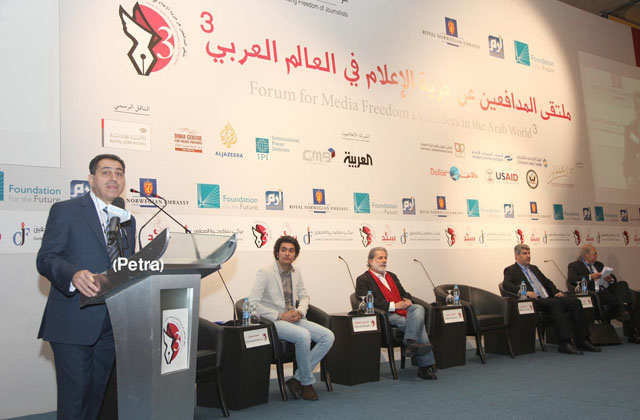AMMAN — Media freedom defenders on Saturday called for more efforts to protect journalists across the Arab world and curb any violations that may prevent them from doing their work.
Participants in the third Forum for Media Freedom Defenders in the Arab World underlined the need for coordinated efforts among national and regional media entities, and NGOs to put an end to these violations, which range from killing journalists in some Arab states to kidnapping, assaults and preventing them from freely performing their duty.”The serious violations against media personnel did not disappear in spite of Arab Spring developments, and in some countries such as Egypt and Tunisia violations reached torture and inhumane treatment,” Centre for Defending the Freedom of Journalists (CDFJ) President Nidal Mansour said at the forum’s main session.
Organised by CDFJ in cooperation with the Norwegian embassy, EREM News and Foundation for the Future, the forum attracted more than 350 journalists, activists and legal experts from across the Arab world and abroad.
“The focus is on reporting the major violations that media professionals face, but there are also other violations no less important, such as preventing access to information, interference, pressures and self-censorship,” Mansour noted.
Bakhtiar Amin, president of the Foundation for the Future, said the Arab world is marked by violations against public freedoms, especially freedom of the press and of expression.
“There is a need for enhanced legislation to provide more protection for journalists,” Amin added.
Forum participants discussed several issues, including the independence of the media, and media and human rights.
One of the major challenges facing media in the region is the control of political powers who are not aware of international press standards, and who place pressure and restrictions on press freedom, participants said.
During the conference, which concludes on Sunday, participants will also discuss the future of online media, the role of artistic communities in defending freedom of speech, the post-2015 UN strategy to integrate media into development and other related issues.
